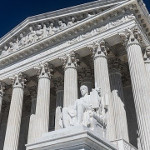Maker of hard seltzer Brizzy charges market confusion with planned launch of Vizzy
Future Proof Brands LLC, the small entrepreneurial beverage company that introduced its Brizzy® premium hard seltzer in 2019, has filed litigation in an Austin federal court, charging that Molson Coors (NYSE: TAP) is infringing on Brizzy’s federally registered trademark and creating market confusion through the industry giant’s planned launch of a competing product, Vizzy, later this year.
In the lawsuit, filed February 6, Future Proof claims that Molson Coors, through its MillerCoors subsidiary, is moving forward with the Vizzy introduction despite the company being fully aware of Brizzy, its trademark and the ongoing distribution of Brizzy products.
“The goodwill associated with the Brizzy mark is a valuable asset to Future Proof, and Future Proof has expended great effort and considerable resources in promoting its products using the BRIZZY mark,” the lawsuit states.
Future Proof launched the four-flavor Brizzy line in 2019 and the brand is currently sold at more than 1,000 retail locations in Texas, Kansas, Virginia, California and North Carolina. Future Proof has sold more than 10,000 cases since September, and projects Brizzy sales to exceed $2.5 million in 2020, with plans to continue expanding distribution.
“The positive market reaction to Brizzy has exceeded our expectations,” says Future Proof CEO Justin Fenchel. “Unfortunately, several wholesalers and retailers are already expressing concerns about likely consumer confusion with Vizzy. The names are nearly identical, they sound alike, the product is similar, the packaging is similar, and we are often distributed by the same wholesalers.”
Future Proof also makes the BeatBox line of alcoholic party punches, which gained national recognition in 2014 when the company gained a $1 million investment from Mark Cuban on ABC’s Shark Tank program. Last year the company was named to Inc. Magazine’s annual list of the 5,000 fastest-growing private companies in the nation. BeatBox’s distribution footprint now covers 22 states, and more than 10,000 retailers.
“We believe that Brizzy is poised to generate similar if not greater success,” said Fenchel. “But a multinational brewing conglomerate doesn’t have the right to bigfoot a smaller competitor and blatantly violate our trademark and jeopardize everything we’ve built.”
During the last decade, the hard seltzer market has grown to account for nearly half of all U.S. mixed drinks sales.
Future Proof is represented in the case by Christopher J. Schwegmann and Kent Krabill of Lynn Pinker Cox & Hurst LLP in Dallas.
The case is Future Proof Brands LLC v. Molson Coors Beverage Company f/k/a Molson Coors Brewing Company and MillerCoors LLC., NO. 1:20-cv-144 in the United States District Court for the Western District of Texas.


